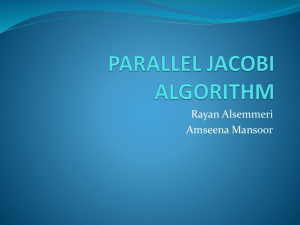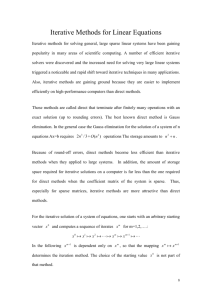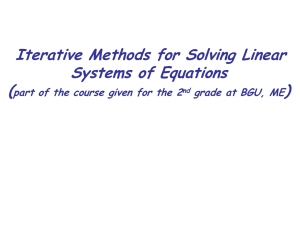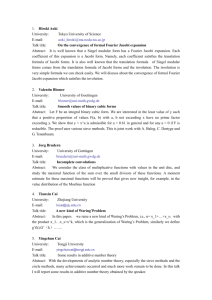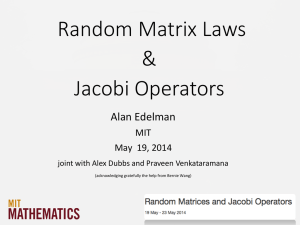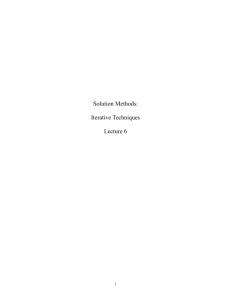*The Interest of Reason Is To Go Without God
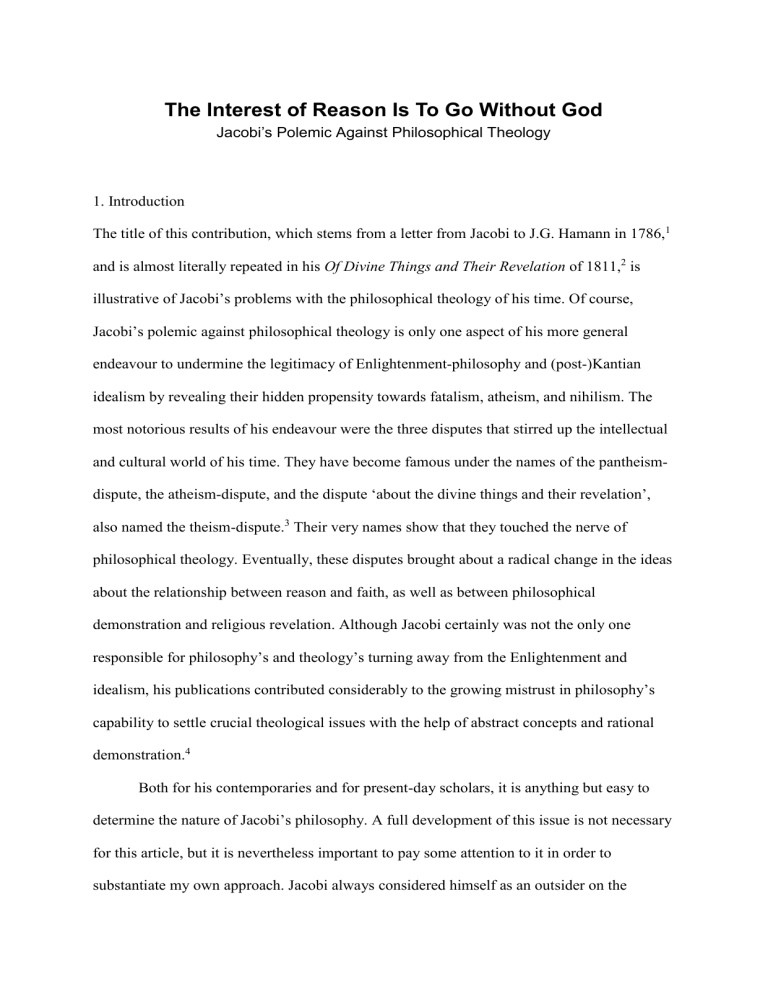
The Interest of Reason Is To Go Without God
Jacobi’s Polemic Against Philosophical Theology
1. Introduction
The title of this contribution, which stems from a letter from Jacobi to J.G. Hamann in 1786,
1 and is almost literally repeated in his Of Divine Things and Their Revelation of 1811,
2
is illustrative of Jacobi’s problems with the philosophical theology of his time. Of course,
Jacobi’s polemic against philosophical theology is only one aspect of his more general endeavour to undermine the legitimacy of Enlightenment-philosophy and (post-)Kantian idealism by revealing their hidden propensity towards fatalism, atheism, and nihilism. The most notorious results of his endeavour were the three disputes that stirred up the intellectual and cultural world of his time. They have become famous under the names of the pantheismdispute, the atheism-dispute, and the dispute ‘about the divine things and their revelation’, also named the theism-dispute.
3 Their very names show that they touched the nerve of philosophical theology. Eventually, these disputes brought about a radical change in the ideas about the relationship between reason and faith, as well as between philosophical demonstration and religious revelation. Although Jacobi certainly was not the only one responsible for philosophy’s and theology’s turning away from the Enlightenment and idealism, his publications contributed considerably to the growing mistrust in philosophy’s capability to settle crucial theological issues with the help of abstract concepts and rational demonstration.
4
Both for his contemporaries and for present-day scholars, it is anything but easy to determine the nature of Jacobi’s philosophy. A full development of this issue is not necessary for this article, but it is nevertheless important to pay some attention to it in order to substantiate my own approach. Jacobi always considered himself as an outsider on the
2 philosophical scene. He basically agreed with F. Schlegel’s characterisation of him as “being not a philosopher by virtue of his profession, but by that of his character,” 5 and consequently defines himself as “an author of coincidence or opportunity, for whom science and truth have no unconditional value, and whose love for science and truth is hence subordinate, interested, and therefore impure.
” 6
Taking into account this self-identification of the nature of Jacobi’s philosophy in relation to the systematic and scientific character of the dominant philosophies of his time, such as those of Kant, Reinhold, Fichte, Hegel, and Schelling, it is no wonder that he qualifies his appearance on the philosophical scene as that of a ‘privileged heretic’.
7
This means that Jacobi does not see himself as someone who refutes a philosophical position, but, rather, as one who contradicts it.
8
This offers an important clue for the interpretation of
Jacobi’s philosophy. Typically, a critic tries to refute the argument of his opponent by showing that it is inconclusive. Hence, a critic has the same argumentative playing field as his opponent, and abides by the same principles and rules of reasoning. A (philosophical) heretic, by contrast, is someone who contradicts the canon of an established (philosophical) tradition, its principles and procedures of validation, etc. In other words, a heretic places himself in an outsider’s position in order to undermine the self-evidence of the system itself.
That is why a heretic often functions as a bad conscience for the established tradition.
9
This precisely is the core of Jacobi’s attitude with regard to the philosophy of his time. Moreover, in order to be a real heretic, it is essential to be characterized by the (philosophical) establishment as such. This is surely the case for Jacobi, whom his contemporaries qualified as an irrational enthusiast (Kant), as someone who makes fun of speculative reason, and whose thinking lacks the connection with true philosophy the most (Hegel) – qualifications which can be seen as the apex of philosophical ostracism.
3
The ‘interested’ and ‘impure’ character of Jacobi’s love for science sheds yet another light on the nature of his philosophy. His love for science is impure because he only intervenes in the ongoing scientific (that is, modern philosophy’s) debate in order to show that it is completely on the wrong track in its dealing with super-sensible issues. Whereas
Kant presented himself as a critic of traditional (i.e., pre-Kantian) metaphysics because it led to transcendental illusion, but welcomed a more modest kind of metaphysics that approached the super-sensible as regulative ideas for our thinking, Jacobi rejects the project of pre-
Kantian (especially Spinoza), Kantian, and post-Kantian (especially Fichte and Schelling) metaphysics altogether. This project makes itself guilty of reducing the super-sensible to a product of reason, thereby annihilating the reality of the super-sensible. Furthermore, the
‘interested’ character of Jacobi’s love for scientific philosophy refers to the fact that he wants to use its outcome, which is inevitably nihilistic, as the firm point of departure for his own salto mortale or mortal somersault (see the last section of this article), which is the first step of his alternative way to think a personal God and human freedom philosophically. In sum, the impurity and interestedness of Jacobi’s love for scientific philosophy are part of a deliberate strategy to clear the way for his own approach of these issues. But the radical nature of his strategy raises the question of whether Jacobi is only expressing his individual, emotional frustration with a strictly logical use of the understanding, which would imply that his approach is philosophically worthless.
The above remarks will serve as the general background of my analysis of Jacobi’s attitude towards philosophical theology. I want to focus on two less well-known (at least in the English-speaking world) texts of his, in which he explicitly deals with this issue, viz., A
Few Comments Concerning Pious Fraud and a Reason Which Is No Reason (1788) and Of
Divine Things and Their Revelation (1811).
10
I shall start by situating two key philosophical theological concepts – deism and theism – against the broader context of modern philosophy.
4
Then, I shall analyse Jacobi’s polemic against deism, followed by an examination of his positive attitude towards theism and an explanation of the reasons why he, at the end of his life, came to identify theism with deism and extended the negative meaning of the latter term to the former. In the final section, I shall outline Jacobi’s alternative idea of philosophical theology. All these sections illustrate my fundamental line of interpretation of Jacobi’s philosophy, namely, that Jacobi succeeds in expressing his antipathy with scientific philosophy, in general, and with its philosophical theology, in particular, in a philosophical way, but without complying with the former’s ‘logical enthusiasm’.
11
2. Some conceptual clarifications
In order to get an idea of Jacobi’s contribution to the debate on philosophical theology, it is first of all important to clarify the key concepts of theism, deism, and naturalism, which play a crucial role in the philosophical and theological discussions of his time.
12
In the middle of the 16 th
century, the term deism was introduced to identify those who wanted to distinguish their idea of natural religion from atheism as well as from traditional revealed religion.
13
Therefore, deists were also called naturalists until the end of the 18 th
century. By contrast, theism leaves open the question of whether God can be known only through natural reason or if he also reveals himself positively. In an important section of the Critique of Pure Reason,
Kant further specifies the distinction between theism and deism .
According to Kant, within speculative theology, which claims to know the original being solely upon reason, one can make a distinction between transcendental and natural theology. Transcendental theology thinks its object by means of transcendental concepts ( ens orginarium, realissimum, ens entium ), and is called deism, while natural theology, which is called theism, thinks its object
“through a concept borrowed from nature (from the nature of our soul) – a concept of the original being as a supreme intelligence.”
14
Deism claims to have a reasonable knowledge of
5 the existence of an original being, which possesses all reality, but it is unable to determine further the predicates of this being because it would then go beyond the transcendental concept of an ens realissimum.
By contrast, theism asserts that reason is indeed capable of determining God as highest intelligence on the basis of his analogy with the human spirit.
“Thus the deist represents this being merely as a cause of the world (whether by the necessity of its nature or through freedom, remains undecided), the theist as the Author of the world,
” who, “through understanding and freedom, contains in itself the ultimate ground of everything else.” 15
Hence, the principled distinction between deism and theism depends on the answer to the question of whether one understands God as an eternal nature that works blindly or as a personal being who through his supreme understanding and freedom is the
Author of all things. Hence, “the deist believes in a God, the theist in a living God (summa intelligentia) .” 16 Although, on practical grounds, Kant leaves open the question concerning the validity of a highest intelligence, in the context of theoretical reason he assigns to transcendental theology the task “to determine the concept of a necessary and supremely real being as precisely as possible, and to free it from whatever runs counter to this supreme reality, that is, what belongs to mere appearance (anthropomorphism in its wider sense).”
17
This shows that Kant is more critical of the theistic predicates of God, which are founded on the analogy with human nature and hence have a smell of anthropomorphism, than he is of the deistic definition of the divine.
Jacobi attached great importance to Kant’s distinction between deism and theism, as becomes apparent from the fact that he quotes the above passage of the Critique of Pure
Reason approvingly various times, not only in his Comments on Pious Fraud, but also in his
Of Divine Things, and, finally, in the third edition of his Spinoza-letters .
18
But unlike Kant,
Jacobi prefers theism over deism unambiguously, especially because theism explicitly states person hood as an essential characteristic of God. “We use the expression God each time
6 when we consider him as a personal being, who is in particular operating through freedom and providence.” 19 Moreover, Jacobi aggravates Kant’s distinction between deism and theism by stating that deism simply negates God´s personhood (and does not leave this matter open, as Kant had written), whereas theism explicitly acknowledges God as a person. Therefore, deism is, according to Jacobi, identical with atheism, because “together with [God’s] personhood, His individuality and consequently his being himself , objective reality, [is] annihilated.” 20 In other words, only a God who not only is , but can also say to himself, I am who I am
, deserves to be called God. This means that the core of Jacobi’s polemic against philosophical theology concerns the truth of his philosophical credo: “I believe in an intelligent personal cause of the world.”
21
As I will show in more detail below, Jacobi stylizes
Spinozism and philosophical idealism as the exact opposites of this credo, not only because they reduce God to a product of human reason and thus annihilate his independent existence, but also because they are only capable of thinking an impersonal All-Unity instead of a personal God.
3. Jacobi’s polemic against deism in his
Comments on Pious Fraud
In his essay Comments on Pious Fraud, Jacobi develops his basic thesis that deism’s annihilation of the reality of a personal God, who reveals himself to human reason, is not due to some logical error, but is an inevitable consequence of the overall rationality-paradigm of the Enlightenment. This means that as soon as in 1788, Jacobi had extended the accusation of atheism, of which he had up to then only reproached Spinoza’s philosophy, to the philosophy of the Enlightenment as such. According to the second half of the title of this essay, deism is dominated by a “reason, which is not reason.” 22
This shows that Jacobi’s polemic against deism should not be misinterpreted as a rejection of reason as such, but is set up from the perspective of a more truthful reason, thereby implying that modern philosophy’s incapacity
7 to think a personal God is a consequence of an ‘unreasonable reason’. The essence of its unreasonableness lies in its striving for absolute autocracy, and its pretension to be able to produce the true autonomously. According to Jacobi, such a pretension is an act of violence against the reality of a personal God as well as against ‘true reason’: the very nature of unreasonable reason is to annihilate what it cannot produce autonomously, and, moreover, it is extremely intolerant with regard to other paradigms of rationality, especially to those which are conscious of reason’s limitation and its dependence on revelation.
23 In the context of
Jacobi’s polemic against philosophical theology, the clearest example of such an act of violence is deism’s pious fraud against revealed faith. According to deism,
The spirit of all positive religion [would be] a terrible nightmare, from which humankind should be rescued at all cost. By contrast, another, non-positive religion, called deism, would be pure truth, pure certainty, pure blessing. This non-positive religion would produce such a clear and perfect conviction of the existence of a free and reasonable cause of the world, of an encompassing providence, of a personal continuation of human existence after death, so that faith would become superfluous and that this […] dangerous word, that dishonours reason, would be banned from human language, and could be replaced by trust [in reason].
24
From a rhetorical perspective, Jacobi’s argument consists in reversing all deistic accusations against revealed faith by interpreting them as reproaches against deism itself: the defendants of faith or positive religion “should consider it [i.e., deism] as a web of ignorance, superstition, deceit and fanaticism, and should attribute its success to a misunderstanding of reason and experience.” 25
Even the expression, ‘pious fraud’, in the title of Jacobi’s text can be interpreted in this way: the editors of the Berliner Monatschrift, a monthly defending the ideas of the German Enlightenment, had used this expression to criticize Jacobi.
26
In the
Comments on Pious Fraud , Jacobi consistently reverses this reproach and turns it against
8 deism; in particular, he accuses it of using unreasonable means in order to reach its goal, the annihilation of revealed religion.
The pivotal point of Jacobi’s investigation into the violent character of deism is the question of whether deism’s central thesis, mentioned above, is the result of clear and distinct concepts of reason only. If this is indeed the case, then any faith in divine revelation would be superfluous and could be replaced by a confidence in the power of reason. But, through an argument reminiscent of Hume, Jacobi argues that the pretention of deism, viz., that on the basis of our knowledge of the empirical world we can formulate true propositions about the inner essence of human nature as well as about the prime cause of things, is untenable and thus unreasonable. Ironically, he notes that such an inference is as unreasonable as inferring from the knowledge of bulbs any conclusion concerning the flowers that spring from them.
From this, Jacobi draws a conclusion, through which he directly polemises against the defendants of reasonable religion, in particular, the deists. He cannot “understand how a reasonable religion could be a reasonable one. Since true reason acknowledges its frontiers, and is conscious of its incapacity to produce such a knowledge of God, the world and our own nature. […] That is why we cannot but take your seemingly reasonable religion for a philosophical fanaticism.” 27
This shows that deism makes itself guilty of a pious fraud: it uses unreasonable means, such as the above fallacy of induction, in order to reach its final goal, viz., liberating humankind from its faith in revelation and establishing confidence in secular reason. This shows that the unreasonableness of deism is not so much the result of a mistake, but of a deliberate deceit. An additional fraud consists in the fact that deism hides its unreasonableness by pretending to possess a “more than prophetic reason, which is moreover infallible in its judgments.”
28
With this, Jacobi reverses another accusation that deism made against positive religion time and again, viz., that of intellectual despotism, and accuses
9 deism of a despotic attitude with regard to faith. Precisely because reason’s capacities to attain knowledge of God, the world, and the inner nature of humans are limited, and because its judgments can never claim infallibility, a plurality of opinions should be allowed: “No opinion is dangerous as long as everyone can freely express his own. By contrast, every opinion is dangerous, if it wants to be the only one and actually reaches a certain degree of dominance.” 29
Precisely through its despotism, deism shows the unreasonableness of its concept of reason, and, even worse, its intellectual violence.
Another aspect of the violence of unreasonable reason is its self-sufficiency. This leads us to the core of Jacobi’s polemic against philosophical theology. Unreasonable reason not only strives after reigning autocratically over religious revelation and other dissident opinions, but extends this attitude to other domains by negating every subordination and dependence as such in the name of reason’s autocracy. Regarding God’s existence, this becomes apparent in reason’s tendency “to submit God himself to its legislation and to prescribe […] how He should be and should act, if He is to remain God.” 30
Hence, Jacobi accuses deism of reversing the true relation between God and reason, leading to a situation in which reason can extend its dominance over the supernatural until it eventually reaches complete autocracy. But as soon as reason tries to produce its content autonomously, it degenerates into pure fantasy or illusion. Because of its complete emptiness, unreasonable reason is even worse than fanaticism: “Reason, when it produces objects , it creates chimeras.” 31
Regarding deism, this means that the God it produces is actually only a fantasyproduct, and thus an idol.
When Jacobi defends revealed faith against deism, his concern is not so much to hold a plea in favour of any specific, historically revealed creed, since, in line with the general conviction of the Enlightenment, he thinks that the essence of a religion lies in its general idea, not in its historical presentation or external shape.
32
What Jacobi wants to point out
10 through the concepts of revelation and faith is that humans can only think God under the condition that he first has revealed himself to them as an objective reality. This is realized through faith, which is an immediate intuition of the super-sensible, just like sensory experience guarantees humans their immediate awareness of empirical reality. Only on the basis of this intuition of God are humans capable of a reflection of God with the help of reasonable concepts, without, of course, being allowed to prescribe how God should be. So, the fundamental problem of deism is that it is a product of unreasonable reason’s general tendency to self-enchantment, which results in subordinating (super-)sensible reality to reason’s concepts, and hence annihilating this reality as something subsistent. In sum, a true knowledge of God is not dependent on human reason, but, rather, this knowledge is dependent on God’s self-revelation as a person.
A final aspect of deism’s fraud is that it deludes humans with the false hope that it is able to save true faith in God by replacing the existing positive, historically revealed religion with a so-called reasonable one. By doing so, deism tries to present itself as politically correct with regard to established faith. But, according to Jacobi, deism is only seemingly and temporarily willing to accept God’s existence, while actually denying it. Deism uses the proofs of God’s existence in order to replace faith in a living, personal God with knowledge of an impersonal original being, and tries to convince the faithful that only this original being is in accordance with the constraints of reason, and that only a so-called reasonable religion meets the requirements of the Enlightenment. By presenting itself in this way, deism can boast to be the saviour of faith. Jacobi, however, thinks that this behaviour only produces an ambiguity, “which permeates all other parts of natural theology, and confuses its language.” 33
In fact, deism presents itself as a mediating concept between faith in a personal God and atheism, while, for Jacobi, besides the mutually excluding concepts of faith and atheism, there is no room for a third option, such as deism or cosmotheism. The final reason for Jacobi
11 to identify deism and atheism is that the former replaces what is the true essence of God, his personhood, with an impersonal original being, such as Spinoza’s natura naturans or the concept of All-Unity.
Moreover, upon closer examination, deism accepts the idea of an impersonal original being only for the time being, that is, as long as science has not reached its final goal, namely, to understand the origin and activity of the world solely on the basis of the laws of physics. If this goal is reached, the need for God as an explanation of the world has disappeared.
Eventually, it will be possible “to see God as a hypothesis that is only invented for the purpose of physics, looking like an upcoming and fleeing ignis fatuus , which constantly moves around and finally disappears.” 34
Because deism denies the factuality of all revelation and wants to stay ‘within the frontiers of pure reason’, it inevitably adopts this reason’s typical attitude of self-sufficiency, leading to an exclusion of God as an alien body from science. Hence, by showing that the ‘reasonable’ character of deism eventually cannot produce or even allow a reasonable religion, but results inevitably in atheism, Jacobi unmasks the explicit pretension of deism to save faith in God as a deceit.
4. Is theism really an alternative to deism?
The crucial question in this investigation of Jacobi’s polemic against philosophical theology is whether his remarks only concern deism or if they also concern theism. Although he had already, since the publication of the Spinoza-letters in 1785, swept away the demonstrable foundation of theism,
35
Jacobi nevertheless continued to use this term in a positive sense in several texts. As mentioned above, this can be explained by the fact that he felt sympathy for
Kant’s definition of theism, stating that God is a free, intelligent being, and hence a person, and even leaving open the possibility of a positive revelation of God. Therefore, it is quite surprising that throughout the second edition of his Comments on a Pious Fraud of 1815, he
12 replaces the word deism with the word theism without any further notice, thereby purposively extending his polemic against deism to theism.
36
In order to find an explanation for Jacobi’s eventual identification of deism and theism, it is necessary to turn our eyes to his Of Divine Things, the central part of which was written in 1811, i.e., four years before the publication of the second edition of the Comments on Pious Fraud.
In Of Divine Things, Jacobi polemically turns against idealistic (identity-) philosophy in general, and in particular against Schelling’s identification of God and nature, culminating in the statement that “[i]t is in the interest of science that there be no God, no super-natural, extra-worldly, supra-mundane being.”
37
In his discussion of idealist philosophy, Jacobi first gives a short historical account, starting with the three transcendental ideas in Kant’s
Critique of Pure Reason. Just as in his Comments on Pious Fraud, he values
Kant for having made a clear distinction between the idea of God as a blindly working eternal nature, as deism thinks, and a personal God, who works through reason and freedom, as theism holds. And just like in his Comments on Pious Fraud, in Of Divine Things Jacobi also quotes the passage from the Critique of Pure Reason in which Kant distinguishes between deism and theism, and repeats how important the (theistic) idea of a personal God is to him.
38
However, in Fichte’s science of knowledge, which Jacobi qualifies as the first daughter of critical philosophy, God’s personhood is explicitly denied: Fichte states that “the concept of
God as a particular substance is impossible and contradictory.” 39
Schelling’s philosophy, which Jacobi calls the second daughter of critical philosophy, goes a step further by giving up the distinction between natural and moral philosophy, necessity and freedom, thus making true Jacobi’s principal thesis that it is in the interest of science that there be no super-natural
God. Jacobi substantiates his interpretation by stating that, according to Schelling, “there is nothing beyond nature, and only nature exists.” 40
For Jacobi, it is clear that with Schelling’s philosophy of nature a new variant of the identity-philosophy comes to the fore, founded on
13 the principle of the hen kai pan (one and all), just as was the case with the philosophies of
Spinoza and Fichte. Hence, Schelling’s philosophy shares the atheism and nihilism of the latter two philosophical systems.
Jacobi’s second line of argument against Schelling’s naturalistic variant of identityphilosophy concerns his claim that philosophy can have a scientific knowledge of God.
Again, he appreciates Kant for having pointed out that God’s existence cannot be demonstrated by speculative reason, thereby implying that science has to remain completely neutral with regard to ‘divine things’. This is even more true with regard to the existence of a living, i.e., personal God:
The simple deduction of the idea of a living God from the disposition of the human capacity to know things does not lead to a proof of his truthful existence; on the contrary such a deduction […] destroys natural faith in a living God, while such a philosophical proof was originally searched after in order to increase and strengthen this natural faith. In the end this strategy does not work, because it […] shows how this idea of God is nothing but a subjective product of human spirit, a pure fantasy.
41
As such, this argument against philosophical theology is not novel because both
Kant’s famous remark that he “had to remove knowing in order to make room for faith,” 42
as well as Jacobi’s conviction, formulated in his earlier writings, that “a God, who could be known would be no God at all,”
43
pointed in the same direction. But in his On the Divine
Things Jacobi goes much further. He shows that it is naturalism’s permanent aim to trespass its confinements to the domain of nature, and to claim scientific knowledge of the supernatural. In particular, he accuses Schelling’s naturalism of not respecting these limits and substantiates this claim by giving a (distorted) quote from the latter’s
On the Relation Of
Creative Arts To Nature, which was the immediate cause for their dispute: Nature is “ the only true God, the living one; by contrast, the God of theism is only a tasteless idol, a phantasm that dishonours reason.” 44 So, given that the aim of naturalism, just like idealism, is to
14 become completely self-sufficient and to develop an immanent system, it is only natural that it wants to exclude God, who is, by definition, super-natural, as much as possible, and replace
God with anonymous nature.
A final aspect of Jacobi’s problems with identity-philosophy concerns its hidden theological agenda. He thereby refers to the ideal of self-sufficiency, which traditionally is an attribute of God: “Only under this condition, namely that nature alone is independent and is all in all, science can flatter itself on attaining its goal of being perfect, on […] becoming itself all in all.” 45
In sum, Jacobi shows that it is science’s positive ambition
“to be like God, to claim omniscience,” 46
as he states in the preface to the third edition of the Spinoza-letters, his last, unfinished text.
In his defence against Jacobi’s attack, that is, in the Important Note Concerning the
Text ‘On the Divine Things By Mr. F.H. Jacobi of 1812, Schelling vehemently repudiates
Jacobi’s accusation that his philosophy is naturalistic: “I give the assurance that it [i.e., the statement that there would be nothing beyond nature, and that only nature exists] cannot be found in any of my writings.
” 47
But what is more important for the problem of philosophical theology, and particularly the question of philosophy’s capability to demonstrate God’s existence as a person, which is the central claim of theism, Schelling states that he not only has tried to underpin the existence of a personal God objectively as early as in the treatise on the essence of human freedom, but also, more generally, that “the perfect, well-founded perception of the existence of this being [i.e., a personal God] could only be the final result of the completely elaborated, encompassing science,”
48
and calls his approach, of all things,
‘scientific theism’. Furthermore, he claims that there can be no opposition between this true, scientific theism and philosophy of nature, since scientific theism, just like God himself, reconciles everything, including spirit and nature. So, Schelling repudiates Jacobi’s fundamental bifurcation, according to which (scientific) philosophy is essentially atheistic,
15 while the nature of theism is inherently unphilosophical. More generally, he considers it to be the task of humankind to elevate its ordinary faith to the level of scientific knowledge. “Man should not stand still, but should grow in the perfection of knowledge until he resembles his original image.” 49
It is no wonder that Jacobi was seriously upset by Schelling’s claim that scientific theism was able to demonstrate God’s personal existence, and by his request that humankind should elevate faith to scientific knowledge. Even more so, Schelling’s redefinition of theism in such a way that it included naturalism undermined Jacobi’s attempt to treat naturalism and theism as the only two possible philosophical systems, mutually excluding each other as regards the principle of a free, intelligent, and, hence, personal God. In fact, Schelling’s
Important Note helped Jacobi to become aware of the fact that theism is as much an offspring of modern, scientific philosophy as deism or atheism, and that they all are, in the end, equally unable to think God as a personal being. In radical opposition to Schelling’s thesis about the connection between theism and naturalism, Jacobi proposes his own thesis that “man reveals
God, because through his spirit he raises himself above nature.” 50
This remark should not be interpreted as if Jacobi were a precursor of Feuerbach’s projection-theory, but in the sense that the human, as a spiritual being, is analogous to God’s spirit. In particular, one is only able to find God as a free, intelligent person if one distances oneself radically from sensuous nature, which is dominated by determinism and mechanism, and in which the idea of a person makes no sense. This also means that God cannot be demonstrated by scientific reason, which can only produce a self-made idol. In sum, Jacobi’s reading of Schelling’s Important Note and Schelling’s defence of scientific theism convinced Jacobi to extend his rejection of deism to theism, and, hence, to replace the term deism with the term theism in the second edition of his Comments On Pious Fraud.
16
5. Jacobi’s alternative philosophical theology
Throughout his writings, Jacobi pays far more attention to his undermining of modern philosophy than to the alternative kind of philosophical theology he favours. Moreover, bearing in mind his sustained emphasis on the importance of faith (as opposed to knowledge) and revelation (versus logical construction) as the only legitimate way to intuit God, this raises the question of whether Jacobi’s own approach to think God can be qualified as philosophical at all. Hence, it is no wonder that most commentators find this aspect of
Jacobi’s philosophy unconvincing and even disappointing.
51
Obviously, a full account of
Jacobi’s alternative philosophical theology would largely exceed the scope of this article.
Therefore, I shall limit myself to discussing what Jacobi himself considers as the true pivotal point of his philosophy, the salto mortale , and its implications for thinking God philosophically.
First of all, Jacobi recognizes that modern philosophy inevitably leads to fatalism, nihilism, and atheism, but is, at the same time, logically irrefutable. Therefore, if one wants to escape from this deadlock, the only option is to distance oneself radically from modern philosophy by performing a radical breach. This is the famous salto mortale , through which
Jacobi extricates himself from the problem of fatalism, and thereby of nihilism and atheism,
52 because, basically, “there is no speculative way at all in order to become conscious of God.“ 53
But, at the same time, Jacobi wants to avoid, at all costs, having his leap end up in a hurtling down into the abyss of irrationality or fantasy, of which he was accused both by some of his contemporaries and by present-day scholars.
54 His solution to this reproach is, first of all, to depart from a firm ground, i.e., an exposition of scientific philosophy and the deadlock in which it inevitably results. That is why Jacobi makes such an effort to analyse the positions for which he feels a fundamental antipathy. But, secondly, in order really to counter the
17 reproach of irrationality, Jacobi also has to substantiate that the ground on which he lands after his salto , and on the basis of which he develops his alternative philosophical theology, is as firm as the ground from which he departed.
55
And, moreover, in order to have any philosophical relevance at all, this new ground has to be accessible by human reason; in other words, it has to be recognized as reasonable by his readership.
56
What do these two requirements mean in the case of Jacobi’s alternative philosophical theology? First, the firmness of the new ground is guaranteed by the fact that God reveals himself to the human mind as something immediately given and as an objective reality: “God is, and is outside me, a living, self-subsisting being.
” 57
Jacobi gives various names to this revelation, such as faith, immediate revelation, substantive reason, and intellectual intuition.
But, if such a faith or intellectual intuition is nothing more than a private, immediate certainty, it cannot be communicated to others, it loses its philosophical relevance, and ends up being only an illusion or fantasy. In other words, in order to count really as philosophical, philosophical theology has to be more than an intellectual intuition of a personal God. This leads to the second requirement of Jacobi’s philosophical theology: philosophical theology should include a conceptual account of what is intellectually intuited. Is Jacobi able to meet this second requirement and, if so, how? Most commentators answer negatively to this question or at least leave it open,
58
but I want to show that Jacobi does have a philosophical theology of his own, although it remains undeveloped.
It goes without saying that Jacobi does not want to ‘demonstrate’ God’s existence, but only ‘hints at’ or ‘refers to’ God through words and concepts. Moreover, this ‘hinting’ and
‘referring’ is primarily of a practical nature: “The way to attain knowledge of the supersensible is a practical, not a theoretical, purely scientific one.” 59
A theoretical approach of
God runs the risk of reducing the question ‘Who is God? ’ to the purely conceptual question
‘What is God?’, thereby negating God as a person. But what exactly is this practical yet
18 philosophical approach of God? Precisely because God is a spiritual person, he manifests himself through all kinds of spiritual experiences of persons, and in the verbal accounts of these experiences. Therefore, Jacobi takes concrete experiences and stories, in which God’s personal acting comes to the fore, as his point of departure. A concrete example of this is that, at the end of the Of Divine Things, he starts from the story of the creation of heaven and earth in Genesis in order to give a philosophical account of the relation between God and humankind; in the same vein he quotes the story about God’s self-manifestation to Moses in the book of Exodus to illustrate God’s personhood.
60
The fundamental insight that substantiates Jacobi’s philosophical approach of God is that the human is “a citizen of two, wonderfully related worlds: a visible and an invisible one, a sensuous and a super-sensuous one.”
61
This implies that a purely spiritual intuition of God is insufficient, and has to be complemented by a material account of God’s existence through words and concepts. Hence, philosophical theology should take these concrete experiences and stories as its point of departure for an interpretation of God, which can justly be labelled as hermeneutical. But it should also keep in mind that this interpretation always falls short of the reality it describes. Jacobi formulates an additional requirement for his philosophical account of God as a person: such an account has to be founded on a basic spiritual sympathy between the personality of the philosopher and the subject of his thinking, God: “Sympathy with the invisibly real, living and true is faith.
” 62
This sympathy, which is necessary for a philosophical account of the human as well as of the divine person, explains why Jacobi calls his philosophy a personal one: “My writings resulted from my most internal life, [and therefore] is my philosophy surely a personal one.” 63 By recounting his personal experiences and hermeneutically interpreting them Jacobi claims to have given the intellectual intuition of
God a meaning that can generally be understood by human reason.
19
Abstract:
Jacobi’s polemics against philosophical theology is meant to show that neither
Spinoza, nor Kant, nor Fichte and Schelling have been able to think God as a person, that is as a free, intelligent being. In order to elucidate Jacobi’s position I focus on two less wellknown texts of his, viz., A Few Comments Concerning Pious Fraud (1788) and Of Divine
Things and Their Revelation (1811). In the second section I situate two key philosophical theological concepts – deism and theism – against the broader context of modern philosophy.
The third section analyses Jacobi’s polemic against deism, followed by an examination of his positive attitude towards theism and an explanation of the reasons why he, at the end of his life, came to identify theism with deism and extended the negative meaning of the latter term to the former. In the final section, I give an outline of Jacobi’s alternative idea of philosophical theology.
1 F.H. Jacobi, Gesamtausgabe. Briefwechsel. Band 5: Briefwechsel 1786 (Stuttgart-Bad Cannstatt:
Frommann-Holzboog, 2005), 412.
2 Jacobi, Gesamtausgabe. Werke. Band 3: Schriften zum Streit über die göttlichen Dinge und ihre
Offenbarung (Hamburg: Meiner, 2000), 96: “Hence, the interest of science is that there be no God, no supernatural, supermundane being.”
3 G. di Giovanni suggests labelling the third dispute the pantheism dispute; see G. di Giovanni, “Jacobi and His Spiritual Landscape: An Essay in Synthesis” in: F.H. Jacobi, The Main Philosophical Writings and the
Novel ‘Allwill‘. Translated from the German, with an Introductory Study, Notes, and Bibliography by George di
Giovanni (Montreal: McGill-Queen’s University Press, 1995), 11. However, I prefer to refer to this dispute as the theism-dispute and reserve the term pantheism-dispute for the dispute that followed the publication of
Jacobi’s Letters on the Doctrine of Spinoza.
My reasons for not following Di Giovanni in this respect are that the name under which the latter dispute has become commonly known is the pantheism dispute, and, more importantly, the dispute between Jacobi and Schelling is focused on philosophical theism. See I. Kauttlis, “Von
‘Antinomien der Überzeugung’ und Aporien des modernen Theismus” in: W. Jaeschke (hrsg.),
20
Religionsphilosophie und spekulative Theologie: der Streit um die göttlichen Dinge 1799-1812 (Hamburg:
Meiner, 1994), 4.
4 Th. Kobusch, “Glaube und Vernunft. Zur Wirkung Jacobis in der Tübinger Schule und im spekulativen Theismus” in: W. Jaeschke and B. Sandkaulen (hrsg.), Friedrich Heinrich Jacobi. Ein Wendepunkt der geistigen Bildung der Zeit (Hamburg: Meiner, 2004), 377-394.
5 See F. Schlegel’s review of Woldemar, quoted in the editor’s commentary to Jacobi, Werke. Band 1:
Schriften zum Spinozastreit (Hamburg: Meiner, 1998), 583.
6 Jacobi, Werke 1, 337.
7 Jacobi, Werke 2: Schriften zum transzendentalen Idealismus (Hamburg: Meiner, 2004), 198.
8 Jacobi, Werke 1 , 290. My interpretation of Jacobi in this and the following paragraph is largely dependent on B. Sandkaulen, Grund und Ursache. Die Vernunftkritik Jacobis (München: Fink, 2000), 31, 49.
9 H.-J. Gawoll, Hegel-Jacobi-Obereit. Konstellationen im deutschen Idealismus (Studien und Quellen zu Hegel und zum Hegelianismus 21) (Frankfurt: Peter Lang, 2008), 28.
10 These two texts are not included in Jacobi, The Main Philosophical Writings .
11 In spite of all its merits, this is my basic problem with Di Giovanni’s interpretation of Jacobi.
Through his detailed reconstructions of Jacobi’s critique of his contemporaries, a reconstruction, it has to be said, which is far more detailed and precise than Jacobi’s own texts, he downplays the originality of Jacobi’s approach by trying to show that, after all, Jacobi did not need a leap to reach his goal. See G. di Giovanni, “The
Last Word: Jacobi on Jacobi” in: Jacobi, The Main Philosophical Writings, 166f.
12 According to Di Giovanni, the controversy between theists and deists, i.e., between those who defended the idea of a personal God and those who wanted to replace it with an impersonal reason or nature, constituted an essential element in the philosophy of the Enlightenment; cfr. Di Giovanni, “Jacobi and His
Spiritual Landscape,” 60.
13 G. Gawlick, “Deismus” in: J. Ritter u.a. (hrsg.),
Historisches Wörterbuch der Philosophie. Band 2
(Darmstadt: Wissenschaftliche Buchgesellschaft, 1971), 43f.
14 Kant, Kritik der reinen Vernunft, B 659.
15 Kant, Kritik der reinen Vernunft, B. 659f.
16 Kant, Kritik der reinen Vernunft, B 661.
17 Kant, Kritik der reinen Vernunft, B 668.
21
18 This and many other remarks show that Jacobi’s relation to Kant’s philosophy is an ambivalent one.
He clearly rejects those parts of his philosophy, which paved the way for idealism, but appreciates Kant’s indefatigably pointing to the limits of (scientific) knowledge, although Jacobi thinks that this comes at the cost of the coherence of Kant’s system (see Jacobi, Werke 2, 192). Unfortunately, some commentators only have an eye for Jacobi’s repudiation of the rationalist and idealist elements in Kant’s philosophy. See, e.g., T. Pinkard,
German Philosophy 1760-1860. The Legacy of Idealism (Cambridge: Cambridge University Press, 2002), 95;
D. Henrich, Between Kant and Hegel. Lectures on German Idealism (Cambridge, MA: Harvard University
Press, 2003), 111. By contrast, Di Giovanni has a much more nuanced view of the relation between Jacobi and
Kant, see Di Giovanni, “The Last Word,” 158.
19 Jacobi, Werke 3 , 28, footnote.
20 Jacobi, Werke. Band 5: Kleine Schriften II (1687-1817) (Hamburg: Meiner, 2007), 116, footnote.
21 Jacobi, Werke 1 , 20. In the appendix IV of the Spinoza-letters Jacobi explains that his thesis about the personhood of God does not concern the theological question about the distinction in God’s essence, of which Herder had reproached him, but the philosophical question of whether the highest being should be thought as natura naturans or as intelligence. See Jacobi, Werke 1 , 219f.
22 Jacobi, Werke 5 , 105.
23 W. Jaeschke, “Eine Vernunft, welche nicht die Vernunft ist. Jacobis Kritik der Aufklärung” in:
Jaeschke und Sandkaulen (Hrsg.), Friedrich Heinrich Jacobi, 201.
24 Jacobi, Werke 5 , 109f.
25 Jacobi, Werke 5 , 110.
26 Friedrich Gedike und Johann Erich Biester, “Nöthige Erklärung über eine Zudringlichkeit” in:
Berlinische Monatsschrift 7 (März 1786), 286. Quoted in: Jacobi, Werke 1 , 544.
27 Jacobi, Werke 5 , 120.
28 Jacobi, Werke 5 , 112.
29 Jacobi, Werke 5 , 125.
30 Jacobi, Werke 5 , 114.
31 Jacobi, Werke 1 , 116.
32 Di Giovanni, “Jacobi and His Spiritual Landscape, ” 41ff
33 Jacobi, Werke 5 , 116, footnote.
34 Jacobi, Werke 5 , 118.
22
35 Kauttlis, “Von ‘Antinomien der Überzeugung’,” 1.
36 B. Crowe does not seem to be aware of the complexities of the distinction between deism and theism in Jacobi’s works. See B. Crowe, “F.H. Jacobi on faith, or what it takes to be an irrationalist,” Religious Studies
45 (2009): 323.
37 Jacobi, Werke 3, 96. With this thesis Jacobi repeats, although phrased a bit differently, his remark, made in a letter to Hamann of 1786, which serves as the title of this contribution (cfr. footnote 1).
38 Jacobi, Werke 3 , 74f.
39 J. G. Fichte, Gesamtausgabe der Bayerischen Akademie der Wissenschaften. Reihe I, Band 5: Werke
1798-1799, (Stuttgart-Bad Cannstatt: Frommann-Holzboog, 1977), 356.
40 Jacobi, Werke 3, 76.
41 Jacobi, Werke 3 , 87.
42 I. Kant, Kritik der reinen Vernunft, B XXX.
43 Jacobi, Werke 2, 193.
44 Jacobi, Werke 3 , 99. For Schelling’s original text see F.W.J. Schelling, “Denkmal der Schrift von den göttlichen Dingen ec. des Herrn Friedrich Heinrich Jacobi und der ihm in derselben gemachten Beschuldigung eines absichtlich täuschenden, Lüge redenden Atheismus” in: Jaeschke (hrsg),
Religionsphilosophie und spekulative Theologie, 247; see also Jacobi, Werke 3 , 225.
45 Jacobi, Werke 3, 96.
46 Jacobi, Werke 1, 344.
47 Schelling, “Denkmal, ” 245.
48 Schelling, “Denkmal, ” 263.
49 Schelling, “Denkmal, ” 263.
50 Jacobi, Werke 3, 117.
51 E.g. Di Giovanni, “The Last Word, ” 164.
52 Jacobi, Werke 1 , 20.
53 Jacobi, Werke 1, 347.
54 According to Kant it is “a leap ( salto mortale ) from concept to the unthinkable”; cfr. I. Kant, “Von einem neuerdings erhobenen vornehmen Ton in der Philosophie” in: Idem, Werke in zehn Bänden. Band 5:
Schriften zur Logik und Metaphysik, (Darmstadt: Wissenschaftliche Buchgesellschaft, 1975), 386. F. Schlegel describes it as “a salto mortale into the abyss of divine mercy”; see F. Schlegel,
Jacobis Woldemar in: Kritische
23
Friedrich-Schlegel-Ausgabe, Band 2, 77. More recently, I. Berlin and F. Beiser interpreted Jacobi as an irrationalist. See I. Berlin, Against the current: essays in the history of ideas (London: Hogarth, 1980), 181 ff., and F.C. Beiser, The Fate of Reason. German philosophy from Kant to Fichte (Cambridge: Cambridge
University Press, 1987), 47. This erroneous interpretation has been justly criticised in various recent studies on
Jacobi: Sandkaulen, Grund und Ursache, 38, footnote, and passim; Di Giovanni, “Jacobi and His Spiritual
Landscape,” 49 and passim; Crowe, “F.H. Jacobi on faith,” 309-324.
55 In his letter to Johann Neeb of May 30, 1817, in which Jacobi explains that the crux of his difference with Hegel lies in the salto mortale, he elucidates this image: “In my case, the salto mortale is not to be understood as a falling head-down from a cliff in an abyss, but as a leap, departing from a flat surface, swinging over rock and abyss , and landing thereafter again steady and healthy on one’s feet. ” See F. Roth (hrsg.),
F.H.
Jacobi’s auserlesener Briefwechsel Band II, (Leipzig: Fleischer, 1827), 466.
56 See Di Giovanni’s discussion of this vital dilemma for Jacobi in Di Giovanni, “Jacobi and His
Spiritual Landscape,” 49f.
57 Jacobi, Werke 2 , 220.
58 Crowe, “F.H. Jacobi on faith,” 316.
59 Jacobi, Werke 1 , 342.
60 Jacobi, Werke 3 , 103 ff., 112 ff.
61 Jacobi, Werke 3 , 102. In this respect, Jacobi agrees with Kant. See Kant, Kritik der reinen Vernunft,
B, 426 footnote.
62 Jacobi Werke. Band 6 Romane I. Eduard Allwill, (Hamburg: Meiner, 2006), 236.
63 Jacobi, Werke 1 , 339.
